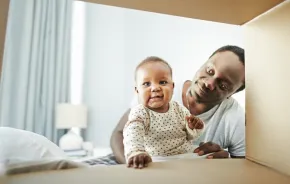 You’re adding to your family. Congratulations! You’ve survived and even thrived as a parent so far, but what happens when you go from expert parent of one to fledgling parent of two? How will your children get along? There’s no way to know. How your toddler treats your baby depends on the child. Don’t assume that if the toddler has always been a “good” child, he or she will be good to the baby. The little girl you once described as a sweet, easy kid may surprise you by hitting, kicking and sitting on her baby brother. On the other hand, a kid who has always been a handful can turn into a saint around a baby.
You’re adding to your family. Congratulations! You’ve survived and even thrived as a parent so far, but what happens when you go from expert parent of one to fledgling parent of two? How will your children get along? There’s no way to know. How your toddler treats your baby depends on the child. Don’t assume that if the toddler has always been a “good” child, he or she will be good to the baby. The little girl you once described as a sweet, easy kid may surprise you by hitting, kicking and sitting on her baby brother. On the other hand, a kid who has always been a handful can turn into a saint around a baby.
“Grant loves his little brother,” says Edmonds mom Jayne Otterlee of the “spirited” 3-year-old boy she’s always chasing. “Except when he throws toys near him (accidentally), he’s very gentle with him.”
“They play together,” says Seattle mom Barbara Izzo, describing her rough-and-tumble 3-and-a-half-year-old daughter, Aria, and her 8-month-old brother. “Aria makes him laugh, doing silly things. She occasionally screams in his face, but nothing harmful.”
But what if your oldest pummels your youngest and demands to be strapped to your chest instead of the baby? How do you handle two?
Christina Oroshiba, a licensed marriage and family therapist at Hope Sparks in Tacoma, has some suggestions on how to manage the transition. The keys to raising two children are consistency, structure and stability. “If you have those three things from day one, you’ll be fine,” Oroshiba says. That said, she offers advice for some specific challenges.
Owww!
If your oldest is hurting your youngest, you must set clear boundaries, ideally from the very beginning, Oroshiba says. Depending on the older child’s age, hitting may be a developmental phase. Children begin to hit before they can express frustration verbally. Oroshiba says that in older children, hitting can be a sign the child’s needs are not being met.
“There’s a lot of jealousy,” says Lynnwood mom Vicki Sargent of her daughters, Amia, age 3, and Sydney, 6 months. “When Amia hits, I figure she’s feeling lonely or left out. I try to balance that by tending more to her. She misses that cuddle time, that one-on-one time we used to have.”
When hitting happens, Oroshiba suggests, get on your knees and ask the older child what she needs from you. Make it clear that hitting is not acceptable. Spending more one-on-one time with the older sibling may also curb the hitting, she adds.
Mommy! Mommy!
What do you do when they’re both clamoring for attention?
“If I pay too much attention to [the baby], Aria will do something to get attention. She wants her channel changed or wants to eat right now,” says Izzo.
Establish rituals, Oroshiba says. Give the older child a favorite snack while you feed the baby, so that she’s eating, too. When you’re done with the feeding, give the older one extra one-on-one time. The object is to get the older child to see the rituals as positive experiences.
Another idea is to give the older sibling a special task to help you feed the baby. For example, have the older one read you a book while you feed the little one. That way, she’s busy and she feels grown up because she’s helping.
That’s mine!
It’s inevitable: Your children will fight over toys. How do you keep conflicts to a minimum? “Give each one a sense of what is and isn’t theirs,” Oroshiba advises. “You say, ‘This is the baby’s. This is yours.’”
The older child needs to understand and discriminate toy ownership. Make her responsible for her own things and teach her which things are shared. The baby will try to play with his sister’s toys, but if you take a toy away, you can easily distract him with something else. After a while, both children will know what they own.
Oh, brother!
You want your kids to love each other. You want to encourage their interest in each other. The baby is easy: He’s naturally interested in his sister. The older sibling may be a different story.
Some kids will take to the younger sibling immediately. “They get along well. Grant leaves the baby alone or he kisses his head when they’re playing,” says Otterlee.
Others won’t. Depending on where they are developmentally, the older child may show no interest in the baby. “A relationship will develop,” Oroshiba says. “Let it happen naturally. Don’t push.” But it is important to stress to the older sibling that being a big sister means she gets to do new, grown-up things, such as help Mommy with baby’s baths or fetch things for Daddy while he changes the baby’s diaper.
No fair!
Most of us want to treat our children equally. We want each one to have the same experiences and advantages. “Let go of that expectation,” says Oroshiba. “It’s not a reasonable expectation for parents.” Each child’s experience will be different.
The second child is born into a world where his parents’ attention is always going to be divided. “I’m letting go of what I can’t do with the baby,” Sargent says. “She gets very little floor time. I enjoyed that with Amia, but I can’t repeat it with her sister.”
Your children will show you who they are and you must treat them accordingly, Oroshiba says. “Kids are individuals. Treat them as individually as possible,” she advises. “Respect who they are. Let the child guide his needs and wants.”
Maria Bellos Fisher is a freelance writer and blogger.











